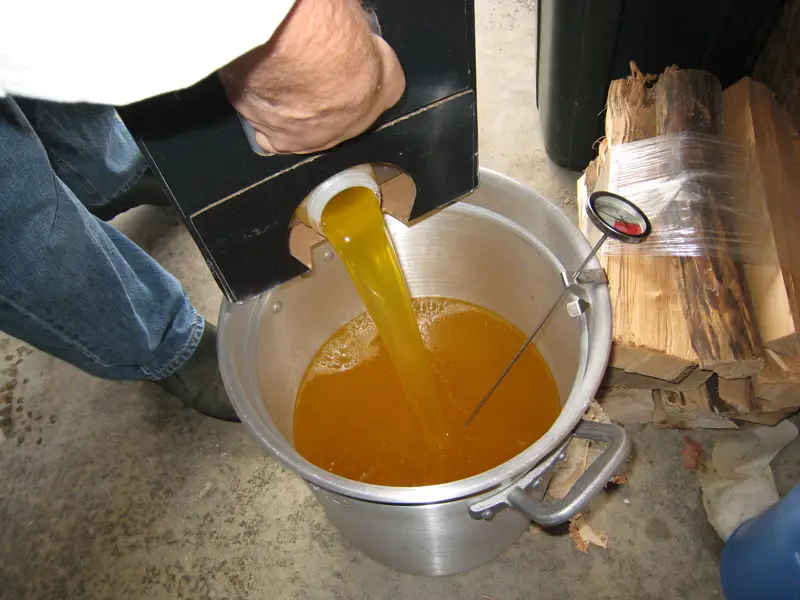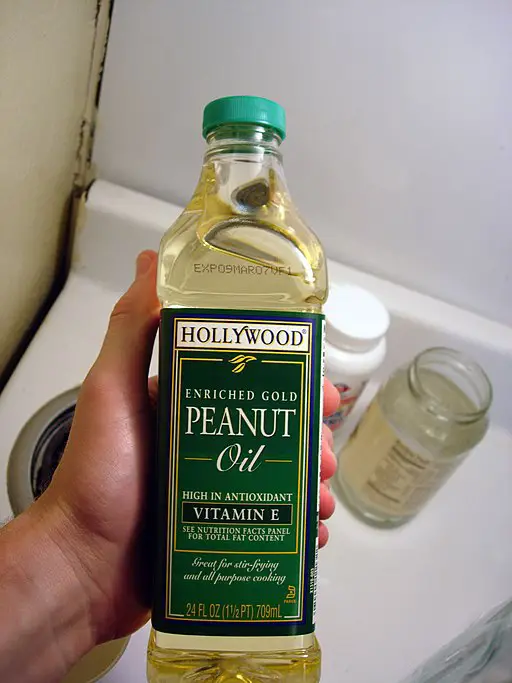Peanut oil is derived from peanuts, imparting a nutty flavor, while vegetable oil is a blend often made from soybean, corn, or canola, with a neutral taste.
TL;DR Peanut oil Vs. Vegetable oil
Peanut oil is derived from peanuts and has a distinct flavor that adds depth to various dishes. It is also known for its high smoke point, making it ideal for deep-frying.
Vegetable oil is a more general term that encompasses various types of oils derived from plants. It is often used in cooking due to its neutral taste and versatility.
What is Peanut oi?

Peanut oil, as the name suggests, is derived from peanuts. It is a popular cooking oil due to its mild flavor and high smoke point. The process of extracting peanut oil involves pressing the peanuts until they release their natural oils. This method helps retain the distinct aroma and taste of peanuts in the final product.
One notable characteristic of peanut oil is its stability at higher temperatures. This makes it ideal for deep-frying and stir-frying dishes as it can withstand the heat without breaking down or producing harmful compounds. Additionally, peanut oil has a longer shelf life compared to other oils, thanks to its high levels of monounsaturated fats.
In terms of texture, peanut oil has a light consistency that allows it to evenly coat food during cooking. This attribute can enhance flavors by locking in moisture and imparting a subtle nutty taste.
From a culinary perspective, peanut oil’s versatility shines through in both Asian-inspired recipes and traditional Western cuisine alike. Its ability to complement various ingredients makes it an excellent choice for sautéing vegetables, marinating meats, or adding depth to salad dressings.
What is Vegetable oil?

Vegetable oil is a commonly used cooking oil that is derived from various plant sources. It is often made from a blend of different oils, such as soybean, canola, corn, sunflower, and safflower oils. This versatility in sourcing allows for a wide range of flavors and textures.
One of the key characteristics of vegetable oil is its neutral taste and high smoke point. This makes it suitable for frying and deep-frying purposes as it can withstand higher temperatures without breaking down or imparting unwanted flavors to the food.
In addition to its culinary applications, vegetable oil also has various non-food uses. It can be found in personal care products like soaps and lotions due to its moisturizing properties. Furthermore, it serves as an ingredient in many household cleaning products because of its ability to dissolve dirt and grease effectively.
From a nutritional standpoint, vegetable oil contains predominantly unsaturated fats which are considered healthier than saturated fats found in animal-based oils like butter or lard. However, it’s important to note that while moderate consumption of unsaturated fats is beneficial for heart health, excessive intake may still contribute to weight gain if not balanced with an overall healthy diet.
Peanut oil Vs. Vegetable oil – Key differences
| Criteria | Peanut Oil | Vegetable Oil |
|---|---|---|
| Source | Extracted from peanuts | Blend often derived from soybean, corn, or canola |
| Flavor | Nutty flavor | Neutral taste |
| Smoke Point | High smoke point (around 440°F or 227°C) | Variable, depends on the blend and refining process |
| Usage | Ideal for high-heat cooking, frying, and Asian cuisines | Versatile, suitable for various cooking methods |
| Nutritional Profile | Rich in monounsaturated fats | Variable, depends on the blend and oil composition |
| Allergies | May cause allergies in individuals with peanut allergies | Generally considered safe for those with allergies to specific oils |
| Cost | Can be more expensive than some vegetable oil varieties | Cost may vary depending on the type of vegetable oil |
| Availability | Widely available, but may be more common in certain regions | Generally widely available |
Peanut oil Vs. Vegetable oil – Nutritional Value
Peanut Oil Nutritional Value (per 1 tablespoon, 14g):
- Calories: 120
- Total Fat: 14g
- Saturated Fat: 2.3g
- Monounsaturated Fat: 6.7g
- Polyunsaturated Fat: 4.3g
- Vitamin E: 11% of the Daily Value (DV)
Vegetable Oil (Soybean Oil) Nutritional Value (per 1 tablespoon, 14g):
- Calories: 120
- Total Fat: 14g
- Saturated Fat: 2.1g
- Monounsaturated Fat: 3.2g
- Polyunsaturated Fat: 7.9g
- Vitamin E: 6% of the Daily Value (DV)
Note: The nutritional values provided are approximate and can vary based on the specific type and brand of oil. Both peanut oil and vegetable oil contribute to the overall fat content in the diet, and their nutritional profiles are similar, with variations in the types of fats present. It’s important to use oils in moderation as part of a balanced diet.
Image Credits
Featured Image By – Adam Engelhart, CC BY-SA 2.0, via Wikimedia Commons
Image 1 By – emilee rader from Lansing, MI, USA, CC BY-SA 2.0 , via Wikimedia Commons
Image 2 By – Karolina, CC BY 3.0 , via Wikimedia Commons








